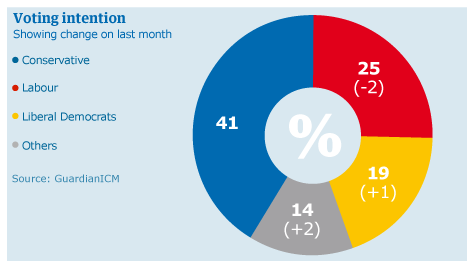
Link to the poll here
Now the Grauniad has its editorial mainly concerned with the fact that Labour's vote is still going down (surprise surprise) making any claims of a "fight-back" ring hollow. Which explains their desperation in attaching all sorts of odious "real meanings" to what Dan Hannan has had to say over the last month. (I mean they must be desperate if they think a comment from Mandelson is going to do anything other than repulse people) However what I find most interesting is the 'change on last month'. The Conservatives, I think, got pretty much their current vote share in early 2008 and since then it's plateaued: Labour is still going down but the Tories aren't going up. So where are those voters going?
The Grauniad poll here shows the Lib Dems going up slightly - other polls I've seen suggest that their vote share is either going down or holding steady, so I'm not sure how much you can read into this. But what I find interesting is that the Other parties have got an increase of +2% over last month. Why, exactly? What have UKIP or the Greens or the BNP or the English Democrats or whoever done in the last month for that? Is it just statistical error? Is the Grauniad's polling service counting that good old British option "I don't know" as "Others"?
Obviously we can't trust polls, as only one really counts, though Political Betting are usually the ones I opt for, but ignoring that contemporary increase, I do think it's interesting that the Other parties' collated vote share is now routinely quoted in double figures. By contrast at the last election in 2005 it was only about 6% altogether. If 14% reflects how people would actually vote on the day, that could be a tectonic plate shifter. Granted the first past the post system means it's very hard for a minor party to be elected to Parliament, but it could still shift things considerably: for instance, if a portion of the Labour vote defected to the BNP in a formerly safe northern seat, the seat might pass to the usual runner-up a long way behind (the Tories or Lib Dems). Or if a portion of the Tory vote defected to UKIP in a safe Tory seat, and so on.
For me, the boring truth is the reason the Tories will win the next election* is the Labour electorate will not turn up. David Cameron will get the Tory die-hards and some independents and will win with that. The other parties will make gains but will be statistically insignificant.
*(Well unless Europe becomes a huge issue in the next eight or nine months and Ken Clarke says something which pisses off the anti-EU crowd. Then if everyone assumes a Tory victory there could be a protest vote for UKIP which would siphon off some marginal seats that would have gone to Tories but instead stay with Lab/Lib) Very unlikely...
EDIT: Just to clarify; that scenario is the most plausible but still extremely unlikely

1 annotations:
I'm so proud that I never look at the Guardian.
Post a Comment